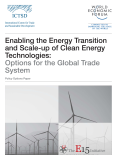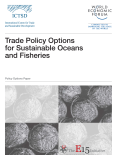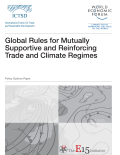
The present paper seeks to examine the ways in which current trade policies and frameworks enable or hold back the pressing need for further development of clean energy. Based on this analysis, it identifies a set of policy options for the global trade system to support the scale-up of CETs. A first set of options is related to addressing systemic issues with a view to enhancing trade governance for renewable energy and climate policies in the context of the WTO framework. These proposals include: 1- an amendment of GATT rules; 2- temporary waivers; 3- an interpretive understanding to clarify existing obligations; 4- a plurilateral agreement; 5- a moratorium on dispute settlement in the area of clean energy.


As the world intensifies its search for global solutions for climate change, far too little attention has been paid in global policy-making to the nexus between climate change and international trade. In particular, important opportunities for the trade system to contribute to addressing climate change have been overlooked. The overriding message addressed to both trade negotiators and climate negotiators in the present paper is that they must begin by acknowledging the inseparability of the two issues with the aim of framing global rules on trade and on climate that are mutually consistent, supportive, and reinforcing.
This working paper provides a first overview of Central Kalimantan’s oil palm value chain and the business actors involved throughout. It aims to identify how business investment can be optimized to support socially inclusive development, delivering productivity, profitability, and sustainability gains.
